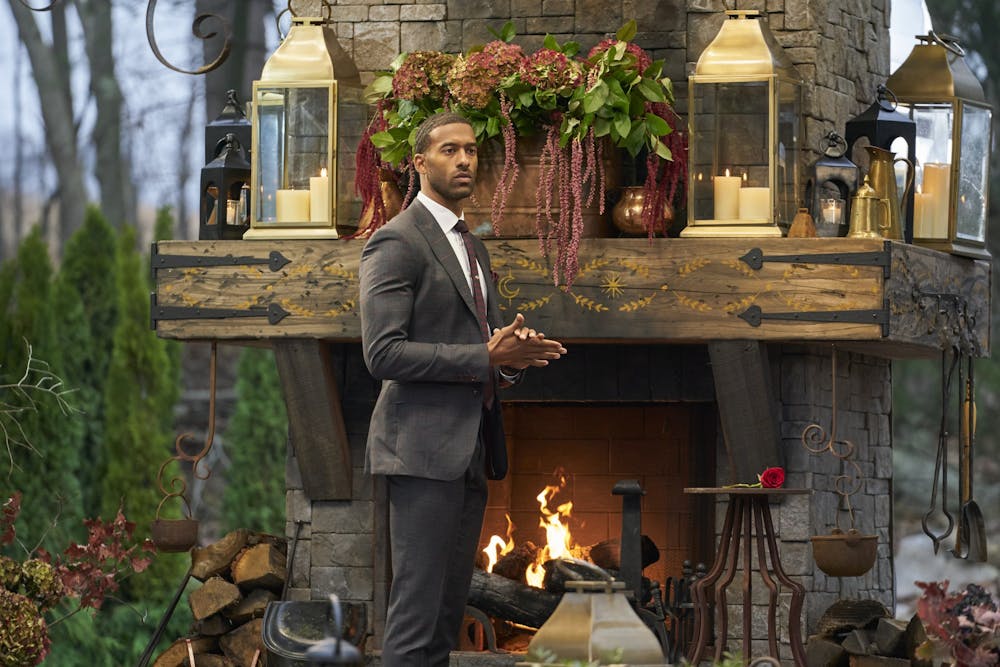I have always been an avid fan of the “Bachelor” franchise — whether I would like to admit it or not. Fake reality is my guilty pleasure. Every Monday night before coming back to Bloomington, my mom, sisters and I would gather on the big brown couch in the living room, snacks in hand, ready to see what drama would unfold that week.
I loved Tayshia Adam’s season of the “Bachelorette.” She was a Black woman, the men got along well, there was diverse casting, and for once, I was not mad about who received the final rose.
Going into season 25, I was hesitantly optimistic. After Tayshia, the second Black bachelorette in history, finished her season up, the first Black bachelor was underway. This season's star, Matt James, was not on the “Bachelorette,” but sometimes change can be good right?
One of the main themes of this season was James' dad's absence in his life. Since the beginning of the season, James made it a point to talk about this aspect of his life.
While growing up without the support of a father is a common situation many face, making it a key point of the season perpetuates a harmful stereotype. I am sure white bachelors in the past have also had complicated relationships with their fathers.
During a personal conversation during the much-anticipated season finale, James discussed wanting to have a family and be a father. He quickly became emotional talking about the things he said he missed out on, saying he guarded his heart and feelings due to what happened in his family — specifically unfaithfulness. He said he doesn't want to make the same mistakes as his father going forward.
“When I needed you, you weren't there to have those conversations,” James said to his father.
There has been studies done in the past about the absent Black father stereotype.
Assistant Secretary of Labor Daniel Patrick Moynihan wrote a report called “The Negro Family: The Case For National Action” in 1965.
The report drew attention to the absent Black father stereotype, saying it destroyed Black families. This stereotype makes Black fathers seem inadequate, but it does not accurately portray Black men.
According to a 2018 study found the majority of non-marital births found Black fathers shared responsibilities and were better co-parents than their Hispanic and white counterparts.
Personal, familial issues being highlighted was not the only questionable part of this historic season.
During the first episode, there was conversation with James and later winner of the season, Rachael Kirkconnell. While they were talking, she made sure to mention how she does not see color.
A white woman with a Black man, not recognizing their Blackness, is not as cute as she thought it was. It actually is not cute at all.
This idea of not seeing color is clearly harmful because it ignores the important aspect of peoples’ identities and how they interact with society.
In the middle of the season, pictures resurfaced of Kirkconnell at an Old South Antebellum party. The time period celebrates slavery and white supemacy. In the photos, Kirkconnell and her friends were wearing the southern belle dresses. After weeks of silence after the photos’ resurface, Kirkconnell went to Instagram and posted an apology.
While the pictures were disturbing, “Bachelor” host Christ Harrison’s response was even more disturbing. In an interview with the first Black bachelorette Rachel Lindsey, Harrison was quick to defend Kirkconnell, calling those calling her out the “woke police.”
He even went on to insinuate that the party was something that was acceptable in 2018, but not acceptable in 2021 — as if the summer of protests last year was the first time people should’ve been held accountable for racism and discrimination.
Despite the most recent casts being some of the most diverse in “Bachelor” history, the deeply rooted systemic issues have not been solved. Masking problems with increasing the number of Black contestants is not going to fix the culture of the show.
Having more producers of color, and potentially replacing Chris Harrison with a person of color, would be a good start to adequately address race issues on the show.






